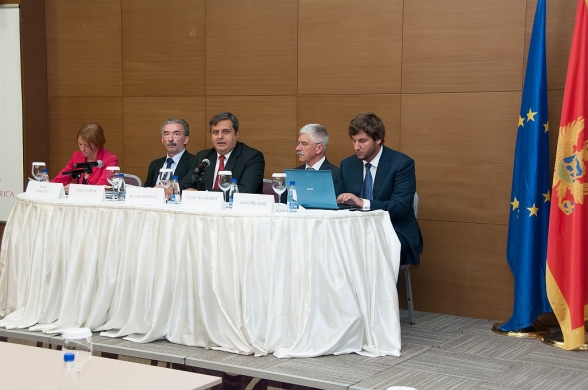The first in a series of public debates on the topic “Montenegro and the European Union – Information Society and Media”, organised by the Committee on European Integration of the Parliament of Montenegro, was held in Podgorica today.
Apart from the Chairperson of the Committee Mr Slaven Radunović, the debate panellists were Mr Mitja Drobnič, Head of the EU Delegation to Montenegro, as well as Mr Anđelko Lojpur, member of the Negotiation Group for Chapter 10 - Information Society and Media.
When welcoming the audience, the MP Radunović pointed out that the Committee on European Integration, with a view to promote transparency of the negotiation process, had decided to organise public debates where the wider Montenegrin public would have the chance to get informed on certain negotiation chapters, but also to point out the need for amending legislation in certain fields. He emphasised that, in order to achieve better communication and cooperation of the Committee with the Government, it was necessary to adopt a document which would define the position of the Parliament in a very dynamic and complex process of Montenegro’s EU accession.
Head of the EU Delegation to Montenegro welcomed the initiative of the parliamentary Committee on European Integration regarding organising of the public debates, emphasising the importance of informing the public on the negotiation process. Commenting the field covered by the Chapter 10, he pointed that the digital society was developing faster than any other social field, and that the internet services and mobile telephone services provide great opportunities for growth, development, and new job. Additionally, he mentioned that the “Digital agenda” as the EU initiative, contained a series of measures, which would contribute to development of the European economy, and the citizens would be provided with a series of advantages of using digital technologies. He commended Montenegro saying that progress had been achieved in regard to harmonisation with the EU regulations relating to Chapter 10, and he also expressed hope that the discussion at the debate would contribute to raising awareness on how much reforms in this field could enhance the lives of citizens of Montenegro.
Presenting the legislation in this field, a member of the Negotiation Group for Chapter 10 said that negotiation Chapter 10 included three fields: electronic communication, roles of the information society, and audio-visual policy. He pointed out that explanatory and bilateral meetings had been held for this chapter, and that the working version of the negotiating position had already been drafted. He pointed out that Montenegro would not ask for exceptions in this field, i.e. that it would be fully prepared to implement the European legislation.
Apart from the mentioned panellists, the public debate was also attended by the media representatives: Mina, Antena M, Vijesti, RTCG, Pobjeda, Pink M, Monitor, Dan, Radio Slobodna Evropa, and NGO representatives from: Institute Alternative and Civic Alliance, Telekom Crne Gore, as well as the members of the Working Group for Negotiation Chapter 10, MPs and the Service of Parliament of Montenegro.









